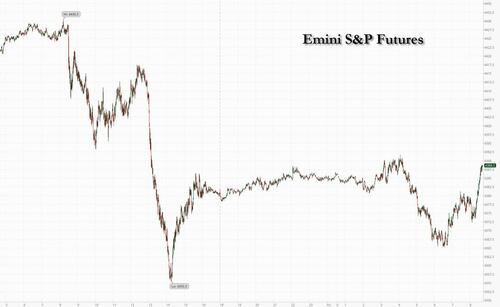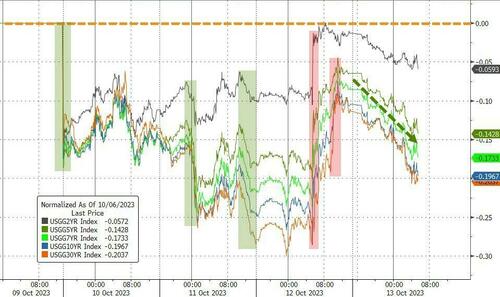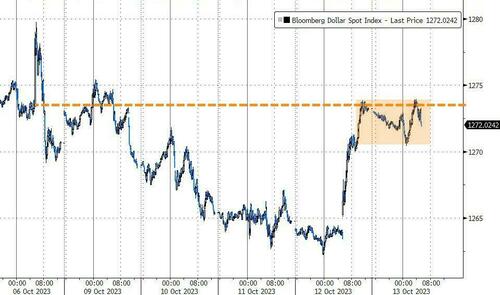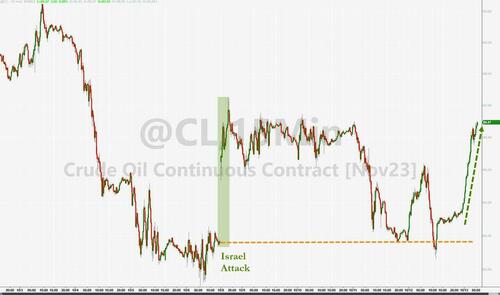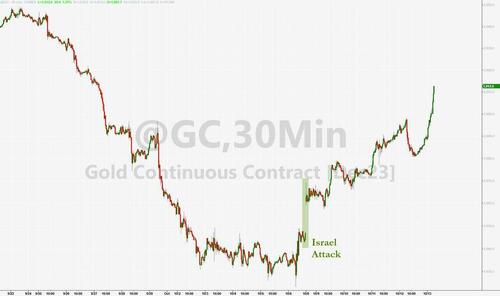


US equity futures reverased earlier losses, thanks to solid results from JPM and Citi...
... while treasuries rallied with 10Y yields tumbling more than 10 basis point to session lows below 4.59% and paring almost all of Thursday’s sharp rise in the wake of hotter-than-expected US consumer price data.
... and while the dollar was largely flat...
... oil soared, with Brent about to rise above $90 again...
... and gold surged...
... as investors scramed to safe havens amid warnings that Israel is preparing for an imminent ground invasion of Gaza.
Helping nudge futures to session highs, JPMorgan, Citigroup and Wells Fargo all gained in premarket trading after earnings beats. Data showing that import prices rose less than expected in September also lifted the mood. Among other US premarket movers, Boeing fell after Ryanair Holdings Plc said delivery delays of 737 Max aircraft have worsened as the aircraft maker grapples with supplier quality-control issues. BlackRock declined after clients pulled a net $13 billion from long-term investment funds, the first outflows since the onset of the pandemic in 2020.
European bonds also gained, with the German 10-year yield falling seven basis points. Crude oil climbed more than 4% in New York, rising above $86 a barrel on fears the Israel-Hamas war could destabilize the Middle East and crimp global supply. “Bonds are rallying ahead of the weekend as traders likely want to hedge geopolitical risk,” said Christophe Barraud, chief economist and strategist at Market Securities LLP.
The Stoxx Europe 600 dropped about 0.8%, led by travel and leisure shares. The energy sector was the only one ini the green as oil majors gained. Among individual movers, Tryg A/S jumped after the Danish insurer reported an earnings beat. Ubisoft Entertainment advanced after the UK approved Microsoft Corp.’s deal to buy Activision Blizzard Inc., which will see the sale of some gaming rights to the French video-game maker. Here are the most notable European movers:
Earlier in the session, Asian stocks fell for the first time in more than a week after brisk US inflation data bolstered rate-hike bets and weakness in China’s economy further soured sentiment. The MSCI Asia Pacific Index slid as much as 1.1%, with Chinese tech giants Tencent, Alibaba and JD.com among the biggest drags. Most markets were in the red as stronger-than-expected US inflation reading reinforced jitters about higher-for-longer rates. Gauges in Hong Kong were the worst performers after China’s consumer and producer prices came in below estimates, underscoring weak demand. Mainland shares only briefly pared losses following a report that China is considering forming a state-backed stabilization fund to shore up confidence in the stock market. The CSI 300 Index was back down more than 1%.
Hang Seng and Shanghai Comp. were lower with tech the worst hit in Hong Kong amid broker downgrades and as the US reportedly eyes closing a loophole that gives Chinese companies access to American AI chips via units located overseas. Furthermore, Chinese inflation data underwhelmed with consumer inflation flat and factory gate prices at a deeper-than-forecast decline, while participants digested mixed trade data in which exports beat expectations but remained in contractionary territory.
“Asia markets are facing a double whammy that casts significant doubt on the optimism-driven rally of the past few days,” said Hebe Chen, an analyst at IG Markets. “The earlier optimism, built on the assumption of a dovish turn by the Fed, now seems much vulnerable. Additionally, China’s disappointing zero CPI figures signal a yellow-light alarm.”
In FX, the Bloomberg Dollar Index falls 0.1%. The Swedish krona is the best performer among the G-10’s, rising 0.4% versus the greenback after CPI topped estimates.
In rates, treasuries held gains across the curve, unwinding a portion of Thursday’s sharp bear-steepening move, with yields richer by 4bp-8bp as US session begins. Intermediates lead, flattening 2s10s back to middle of Thursday’s range. US 10-year yields down more than 8bp at 4.60%, at session lows, outperforming gilts and bunds by ~3bp and ~1bp in the sector; front-end lags, with 2-year yields richer by ~4bp on the day. Haven demand is among the catalysts a ground invasion of Gaza by Israel appears likely. US session includes University of Michigan sentiment data, while 3Q earnings season starts with reports from JPMorgan, Citigroup and Wells Fargo. Meanwhile, the prospect of higher-for-longer US interest rates also weighed on risk appetite. Swap contracts pushed the odds of another quarter-point Federal Reserve hike to about 40% — from closer to 30% Wednesday. US economic data slate includes September import/export price index (8:30am) and October preliminary University of Michigan sentiment (10am).
In commodities, crude futures jumped over 4% to trade above $86. The risk-off tone has also benefited spot gold which adds 1%. An escalation of Israel’s war with Hamas, drawing in Iran, could send crude oil to $150 a barrel and cut about $1 trillion off world economic output, according to Bloomberg Economics.
Looking to the day ahead now, and data releases include Euro Area industrial production for August, whilst in the US we’ll get the University of Michigan’s preliminary consumer sentiment index for October. From central banks, we’ll hear from ECB President Lagarde, Bundesbank President Nagel, BoE Governor Bailey, Deputy Governor Cunliffe, and the Fed’s Harker. Finally, today’s earnings releases include JPMorgan, Citigroup, Wells Fargo and BlackRock.
Market Snapshot
Top Overnight News
A more detailed look at global markets courtesy of Newsquawk
Asia-Pacific stocks were mostly lower amid headwinds from the US where headline CPI data topped forecasts, while the region also digested softer-than-expected inflation and mixed trade data from China. ASX 200 was pressured with underperformance in real estate and tech alongside rising yields and as markets reflected on the latest gauges into the economic health of Australia’s largest trading partner. Nikkei 225 traded negatively but with price action choppy and downside stemmed as Japan plans to release an economy security plan to protect vital industries like semiconductors and with index heavyweight Fast Retailing boosted by earnings. Hang Seng and Shanghai Comp. were lower with tech the worst hit in Hong Kong amid broker downgrades and as the US reportedly eyes closing a loophole that gives Chinese companies access to American AI chips via units located overseas. Furthermore, Chinese inflation data underwhelmed with consumer inflation flat and factory gate prices at a deeper-than-forecast decline, while participants digested mixed trade data in which exports beat expectations but remained in contractionary territory.
Top Asian News
European bourses have been tilting lower since the cash open despite a lack of major headlines during the European morning, with traders cognizant of geopolitical risks heading into the weekend. Sectors in Europe are mostly in the red with clear outperformance in energy as crude prices continue marching higher, while Banks, Financials and Healthcare lag. US futures have tilted lower alongside the European equity markets as broader sentiment deteriorates, albeit losses across US futures are modest.
Top European News
FX
Fixed Income
Commodities
Geopolitics
US Event Calendar
DB's Jim concludes the overnight wrap
After a big rally for sovereign bonds at the start of the week, the sell-off resumed once again yesterday, thanks to an upside surprise in the latest US CPI print. The release showed that core CPI was at a 5-month high, and offered a fresh reminder that the road back to target is unlikely to be a smooth one. In turn, investors grew more confident that the Fed might raise rates again this year, and we even saw the 30yr Treasury yield experience its biggest daily rise since the Covid turmoil of March 2020, with a +16.0bps increase to 4.85%. That adjustment in rates meant that equities lost ground as well, with the S&P 500 ending its run of 4 consecutive gains to fall -0.62% .
Looking at the details of that CPI print, it was mostly bad news from a market perspective. The main story was that headline CPI came in at +0.40%, which was above the consensus of economists at 0.3%, along with market pricing via inflation swaps, which were expecting +0.25%. It wasn’t just the headline number that came in strong however, as the core CPI measure was running at +0.32%, with decent increases in some of the stickier categories as well. It was also a broad-based move, as the Cleveland Fed’s trimmed mean CPI measure that excludes the biggest outliers rose to +0.40%. So the data cemented the picture that inflation has been ticking up in recent months, and if you just look at the last 3 months, the annualised rate of CPI is now at +4.9%, which is the highest it’s been since August 2022. That’s offering some pushback against the more positive inflation narrative from a couple of months ago, and on the back of the release, our US economists have upgraded their near-term expectations for inflation, largely because of a stronger trajectory in rental inflation. See their reaction note here for details.
When it comes to the Fed, there’s still pretty strong scepticism about a hike in November, which is only priced as a 10% chance. But when it comes to December, futures raised the chance of a hike to 39% by that meeting, up from 30% the day before. That was also supported by the latest jobless claims data, which came in at 209k (vs. 210k expected) over the week ending October 7, in line with the lower levels of more recent weeks.
We didn’t hear much from Fed officials themselves, apart from Boston Fed President Collins, who echoed other recent Fedspeak in saying that if the recent rise in yields persists, it “likely reduces the need for further tightening”. But she wouldn’t take further tightening off the table and said that “today’s CPI release is a reminder that restoring price stability will take time”. Chair Powell is due to speak on Thursday next week, just before the pre-meeting blackout period begins, so that’ll be an important event on the calendar.
For sovereign bonds, the CPI proved to be a tough backdrop, and the 10yr yield was up +14.0bps by the close to 4.70%. That was its biggest daily increase since early May, back when the 10yr yield was still below 3.5%, and the move was led predominantly by higher real yields, which rose +10.8bps on the day. For the 30yr yield the move was even more dramatic, with a +16.0ps rise to 4.85%, which was the biggest daily rise since March 2020 at the height of the financial turmoil around the Covid-19 pandemic. That wasn’t helped by a 30yr auction, which was awarded at a post-2007 high of 4.837%, as weak end-investor demand led to the largest primarily dealer take up of a 30-year auction since December 2021. 30yr yields spiked by around 5bps following the auction results.
Over in Europe, the sell-off also had a clear impact, with yields on 10yr bunds (+6.8bps), OATs (+7.5bps) and BTPs (+9.8bps) all moving higher. That wasn’t helped by the latest rise in natural gas prices, which were up another +15.05% to €53.00 per megawatt-hour, which is the highest they’ve closed at since February. The latest moves follow several concerns about global supply over recent days, as well as forecasts showing much cooler weather in Europe over next week. Fortunately, gas prices are still some way beneath their levels from this time last year, and European gas storage is also fuller than at this point in 2021 and 2022, but this is still a concerning trend at a time when recent CPI prints have already been returning the focus back to inflationary pressures.
Whilst equities had initially been resilient, they took a tumble in the US after the 30yr auction, and the S&P 500 ended the day -0.62% lower. T he declines were fairly broad-based, but small-caps took a particular hit and the Russell 2000 ended the day -2.20% lower, which is its worst daily decline since April. By contrast, the FANG+ index of megacap tech stocks still lost ground, but was only down -0.28%, whilst European markets closed before the worst of the US losses, meaning the STOXX 600 ended the day up +0.10%. Today will see earnings season begin to get going, so plenty to keep an eye out for, including releases from several US financials.
That downbeat mood has continued overnight in Asia, where the major equity indices have all lost ground. The Hang Seng (-2.11%) is the biggest underperformer, but other indices including the CSI 300 (-1.11%), the KOSPI (-0.98%), the Shanghai Comp (-0.64%) and the Nikkei (-0.42%) have also declined. The moves come as China’s inflation data was weaker than expected, with CPI at 0.0% in September on a year-on-year basis (vs. +0.2% expected). Looking forward however, US equity futures have stabilised overnight, with those on the S&P 500 up +0.11%.
In the political sphere, the US House of Representatives remains without a speaker for the time being, and the latest news is that House Majority Leader Steve Scalise has withdrawn his name. He’d previously won the GOP nomination for speaker by a 113-99 vote, but there was clear opposition to his candidacy from some other Republicans, and to become Speaker, they would need to win a majority of the entire House of Representatives, meaning they could only lose a very small number of Republicans given their narrow majority. Currently, the House is unable to conduct business until a new speaker is elected.
Looking at yesterday’s other data, UK GDP grew by +0.2% in August, in line with expectations. Later on, we also heard from BoE chief economist Pill, who said that interest rate decisions were becoming “finely balanced”.
To the day ahead now, and data releases include Euro Area industrial production for August, whilst in the US we’ll get the University of Michigan’s preliminary consumer sentiment index for October. From central banks, we’ll hear from ECB President Lagarde, Bundesbank President Nagel, BoE Governor Bailey, Deputy Governor Cunliffe, and the Fed’s Harker. Finally, today’s earnings releases include JPMorgan, Citigroup, Wells Fargo and BlackRock.

